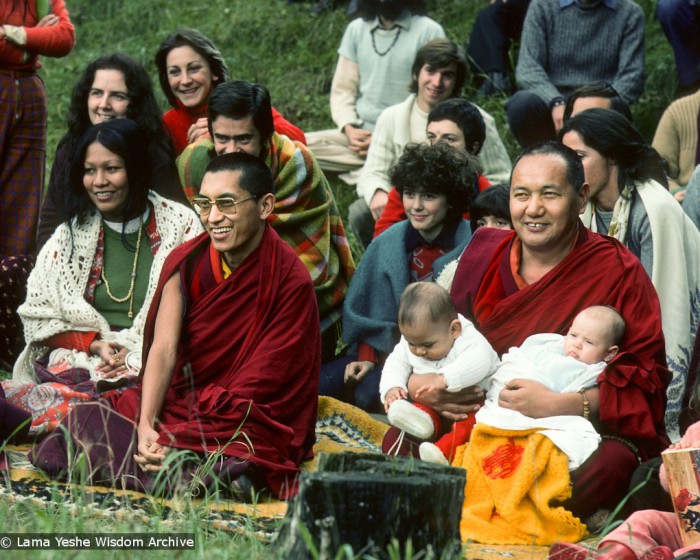
Many religions teach the importance of universal love, but the question is, how to develop that within yourself.
You can’t actualize universal love simply by reciting “universal love, universal love, universal love.” Therefore, how do you gain that realization?
According to Lord Buddha, the first step is to develop a balanced mind towards all living beings; before you can attain universal love, you have to feel equilibrium with all beings in the universe. Therefore, the first thing to do is to train in equilibrium, and you’re just dreaming if you think you can develop universal love without it.
Otherwise, you think that universal love is a wonderful idea, but at the same time are fanatical about the religion you’ve adopted. You have the fixed idea, “This is my religion.” When somebody from another faith comes along, you feel uncomfortable; there’s conflict in your mind. Then where’s your universal love? Although you think it’s fantastic, you can’t manifest it because your mind is unbalanced.
For universal love to come into your mind, you have to develop the feeling of equilibrium with all beings in the universe.

But that’s easier said than done, so perhaps I should explain how to develop equilibrium.
We do it in sitting meditation. Visualize in front of you a person who makes you agitated; someone you don’t like. Visualize behind you the person to whom you are most attached. And visualize all around you the people to whom you feel indifferent; those who are not friends, relatives or enemies. Look at these three classes of person—friend, enemy and stranger—and meditate; see how you feel about each.
When you look at your dear friend, a clinging feeling comes up; you want to go in that direction. When you look at the person who hurts and bothers you, you want to turn away; you reject that person.
This is a very simple way of checking how you feel about different people; it’s not complicated. Just visualize them and see how you feel. Then ask yourself, “Why do I feel differently about different people? Why do I want to help the person I like and not the one I hate?” If you’re honest, you’ll find that your answers are the completely unreasonable responses of a deluded mind.
What this means is that you don’t really understand the impermanent nature of human relationships. Those who know the real, true nature of the human mind understand that relationships are completely changeable and that there’s no such thing as a permanent relationship; it’s impossible, even though you want it.
But check back through the entire history of life on Earth, from the time it began up to now: where is that permanent relationship? When has there ever been a permanent relationship? It should still be here. But it’s not, because there’s no such thing.

Moreover, your judgment of people as friend, enemy and stranger is a complete misconception. For one thing, it’s based on totally illogical reasons. Whatever your reasons, your feelings of “I like him, I don’t like her” are totally illogical. They have nothing whatsoever to do with the true nature of either subject or object.
By judging people the way you do, you’re like a person who has two extremely thirsty people coming to the door begging for water, and then arbitrarily choosing one, “You, please come in,” and rejecting the other: “You, go away.” That’s exactly what you’re like.
If you really check up with introspective knowledge-wisdom, you’ll see that your judgment of good and bad comes from concern for only your own selfish pleasure and never the pleasure of others.
Check up: visualize all universal living beings around you and realize that equally, just like you, they all want happiness and don’t want unhappiness. Therefore, there’s no reason to make the psychological distinction between friend and enemy, wanting to help the friend with extreme attachment, and wanting to give up on the bothersome, conflict—generating enemy with extreme dislike.
That kind of mind is completely unrealistic, because as the dissatisfied human mind goes up and down, those kinds of relationship naturally change.
Even if you do want to feel angry toward another, it’s the person’s deluded mind you should be upset with, not his physical body. His mind is uncontrolled; he has no choice. When he attacks you, he’s being driven by uncontrolled attachment or anger; that’s what you should be angry at.
If somebody hits you with a car, you don’t get angry at the car, do you? You get upset with the driver. It’s exactly the same thing. The inner driver is the person’s dissatisfied mind, not the symptoms of his emotions. Therefore, it’s not your enemy himself but his delusions that you should be angry at. What a person says or does is simply symptomatic of what’s in his mind.
Anyway, that’s the approach to developing equilibrium, and the more you practice it, the more you’ll realize that in reality, there’s no reason to distinguish sentient beings as friend, enemy and stranger on the basis of the extremes of attachment and hatred; only an unhealthy mind does so.
And when you do experience equilibrium, you’ll be amazed at how your view of your enemy changes. The person who agitated and bothered you appears completely different—not because he has changed but because your mind has; you’ve changed your perception. This is not a fairy tale; this is reality.
When you change your attitude, your view of the sense world changes as well. When your mind is foggy, the world about you seems foggy; when your mind is clear, the world about you appears beautiful. You know this from your own experience.
Your view of the world comes from your mind; it’s a reflection of your mind. There’s no permanent, perfectly good thing in the world. Where could you find such a thing? It’s impossible.

You have to know your own psychology, how your mind works, how you discriminate between sentient beings because of unrealistic, illogical reasons. Therefore, you need to meditate.
To discover universal love within your mind, you have to develop a feeling of equilibrium with all living beings in the universe. Once you’ve developed equilibrium, you don’t have to worry about universal love; it will come automatically. That’s how human psychology works. It’s not something you can force: “Oh, universal love. I become you; you become me.” What is that? Don’t think that way.
When your mind is balanced with an equal feeling for all living beings, you’ll automatically be happy. You won’t have to say, “I need happiness.”
You’ll automatically be peaceful and happy, and furthermore, your body and speech will generate a peaceful vibration that will automatically benefit others, beyond words. Wherever you go, that vibration will be with you. But it’s impossible to reach that level without meditation. Without meditating, you can’t release any attachments, either spiritual or material, let alone experience universal love.
The Mahayana way of bringing the mind to enlightenment is gradual. As we have seen, in order to develop universal love, we first have to develop equilibrium. On this basis, we generate the bodhisattva’s mind of enlightenment, bodhicitta, and having done so, our duty is to actualize the six perfections of charity, morality, patience, effort, concentration, and wisdom.
Read more from Lama Yeshe’s The Peaceful Stillness of the Silent Mind, a series of lectures given in Australia in 1975. Edited by Nicholas Ribush. Freely available from the Lama Yeshe Wisdom Archive.
Relephant:
Impermanence: Friend & Foe.
Author: Lama Thubten Yeshe
Editor: Catherine Monkman
Photos: Author’s Own
Facebook is in talks with major corporate media about pulling their content into FB, leaving other sites to wither or pay up if we want to connect with you, our readers. Want to stay connected before the curtain drops? Sign up for our curated, quality newsletters below.








Read 2 comments and reply